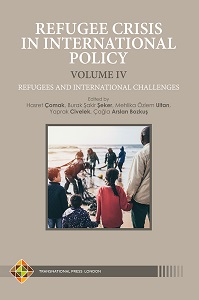Determining The Socio-Economic and Security Impacts of Rohingya Refugees on Neighbouring Countries: Bangladesh and India
Determining The Socio-Economic and Security Impacts of Rohingya Refugees on Neighbouring Countries: Bangladesh and India
Author(s): Murat Pınar, Soyalp Tamçelik
Subject(s): Migration Studies, Socio-Economic Research, Asylum, Refugees, Migration as Policy-fields
Published by: Transnational Press London
Keywords: Migration Series; Climate change; DACA; immigrants; international policy; irregular migration; maritime security; migration policy; refugee crisis; refugee law; refugees; Rohingya; terrorism;
Summary/Abstract: Migration and refugee movement, affecting most parts of the modern world in a direct or indirect way, are among the top issues that require a global responsibility and burden sharing. More and more people are leaving their homes, lands, jobs, workplaces, habits, cultural heritage, relatives, loved ones and eventually their countries. While migrants mostly relocate due to factors such as underdevelopment, climate change and natural disasters, refugees are subjected to forced migration due to factors such as wars, discrimination, human rights violations and genocide. Therefore, it can be said that migrants opt to relocate, whereas refugees are forced to do so.
Book: Refugee Crisis in International Policy - Volume IV: Refugees and International Challenges
- Page Range: 169-200
- Page Count: 32
- Publication Year: 2021
- Language: English
- Content File-PDF

